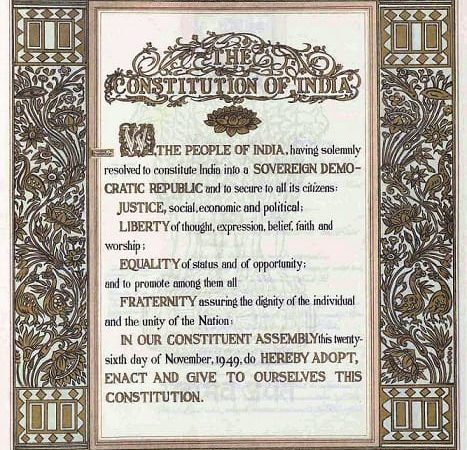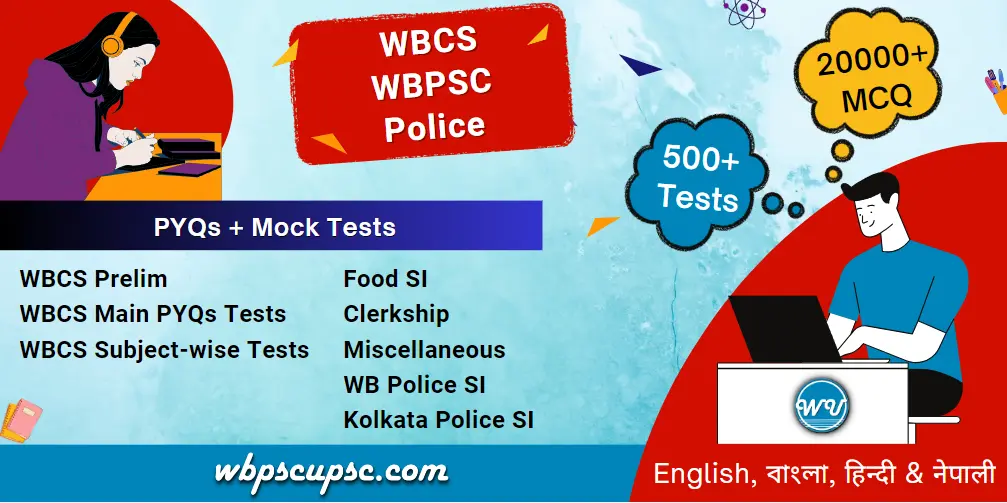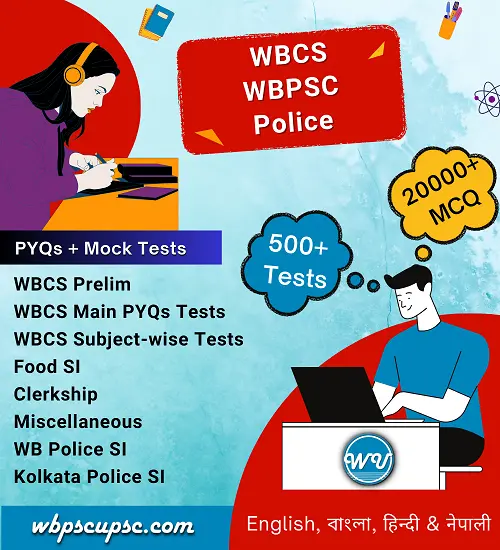Preamble to the Constitution of India
Contents
Preamble of Indian Constitution
WE, THE PEOPLE OF INDIA, having solemnly resolved to constitute India into a SOVEREIGN SOCIALIST SECULAR DEMOCRATIC REPUBLIC and to secure to all its citizens:
JUSTICE, social, economic and political;
LIBERTY of thought, expression, belief, faith and worship;
EQUALITY of status and of opportunity; and to promote among them all
FRATERNITY assuring the dignity of the individual and the unity and integrity of the Nation;
IN OUR CONSTITUENT ASSEMBLY this twenty-sixth day of November, 1949, DO HEREBY ADOPT, ENACT AND GIVE TO OURSELVES THIS CONSTITUTION.
Preamble of Indian Constitution

preamble meaning
- American Constitution was the first to begin with a Preamble.
- Many countries, including India, followed this practice.
- The term ‘preamble’ refers to the introduction or preface to the Constitution.
- It contains the summary or essence of the Constitution.
- N. A. Palkhivala, called the Preamble as the “identity card of the Constitution“.
- It also called “Political Horoscope of Indian Constitution” by K. M. Munshi and “Soul of the Constitution” by Thakurdas Bhargav.
preamble meaning
Preamble of Indian Constitution
Components of Preamble to the Constitution of India
- Source of authority of the Constitution
- “We the people of India” – The ultimate sovereignty, and authority of the people of India.
- Nature of Indian State
- Objectives of the Constitution
- Date of adoption of the Constitution
preamble meaning
Preamble of Indian Constitution
Nature of Indian State
Sovereign
- The word ‘sovereign’ implies that India is neither a dependency nor a dominion of any other nation, but an independent state.
- India’s membership of the United Nations Organization (UNO) or Commonwealth also in no way constitutes a limitation on her sovereignty.
- Being a sovereign state, India can acquire a foreign territory or cede a part of its territory in favor of a foreign state.
Preamble of Indian Constitution
Socialist
- The term was added by the 42nd Amendment in 1976.
- The Constitution had a socialist content in Directive Principles of State Policy before 1976 as well.
- Congress party adopted a resolution to establish a ‘socialistic pattern of society’ in its Avadi session in 1955.
- Indian brand of socialism is a ‘democratic socialism’ and not a ‘communistic socialism’.
- Supreme Court says, ‘Democratic socialism aims to end poverty, ignorance, disease and inequality of opportunity.
- Indian socialism is a blend of Marxism and Gandhism, leaning heavily towards Gandhian socialism.
- The new economic policy (1991) of liberalization, privatization, and globalization has diluted the socialist credentials of the Indian State.
preamble meaning
Secular
- The term ‘secular’ was added by the 42nd Constitutional Amendment Act of 1976.
- Supreme Court said in 1974 that, the words ‘secular state’ were not mentioned in the Constitution, but there can be no doubt that Constitution-makers wanted to establish such a state.
- Articles 25 to 28 of the constitution prove that.
- Unlike Western countries, secularism in India does not separate religion and state.
- The Constitution of India has allowed interference of the state in religious affairs.
- The code of law is unequal and varies with religion, on matters of marriage, divorce, inheritance, and alimony.
- The Constitution of India permits partial financial support to religious schools, buildings, and infrastructure by the state.
preamble meaning
Democratic
- Democracy is of two types
- Direct
- Indirect
- In direct democracy, the people exercise their supreme power directly as is the case in Switzerland.
- There are four devices of direct democracy
- Referendum
- Initiative
- Recall
- Plebiscite
- In indirect democracy, representatives elected by the people exercise the supreme power.
- They carry on the government and make the laws.
- This type of democracy, is also known as representative democracy.
- It is of two kinds
- Parliamentary
- Presidential
- Universal adult franchise, periodic elections, rule of law, independence of judiciary, and absence of discrimination on certain grounds are the manifestations of the democratic character of the Indian polity.
- The term ‘democratic’ is used in the Preamble mean
- Political democracy
- Social democracy
- Economic democracy
- Dr. Ambedkar said in his concluding speech in the Constituent Assembly on Nov 25, 1949 “Political democracy cannot last unless there lies at the base of it social democracy”.
- Social democracy means a way of life that recognizes liberty, equality, and fraternity.
preamble meaning
Republic
- A democratic polity can be classified into two categories – monarchy and republic.
- In a monarchy, the head of the state (king or queen) enjoys a hereditary position, that is, he comes into office through succession, Ex – Britain.
- In a republic, the head of the state is always elected directly or indirectly for a fixed period.
- The term ‘republic’ in our Preamble indicates that India has an elected head called the President.
- He is elected indirectly for a fixed period of 5 years.
- A republic also means two more things
- Vesting of political sovereignty in the people and not in a single individual like a king.
- Absence of any privileged class and hence all public offices are opened to every citizen without any discrimination.
preamble meaning
preamble meaning
Objectives of the Constitution of India
Justice
- The term ‘justice’ in the Preamble embraces 3 forms
- Social
- Economic
- Political
- It is secured through various provisions of Fundamental Rights and Directive Principles.
- Social justice denotes the equal treatment of all citizens without any social distinction based on caste, colour, race, religion, sex, and so on.
- Economic justice denotes the non-discrimination between people on the basis of economic factors.
- A combination of social justice and economic justice denotes what is known as ‘distributive justice’.
- Political justice implies that all citizens should have equal political rights, equal access to all political offices and equal voice in the government.
- The ideal of justice – social, economic and political has been taken from the Russian Revolution (1917).
Liberty
- ‘Liberty’ means the absence of restraints on the activities of individuals.
- It also provides opportunities for the development of individual personalities.
- The preamble secures to all citizens of India, the liberty of
- Thought
- Expression
- Belief
- Faith
- Worship
- It is provided by Fundamental Rights, enforceable in court of law, in case of violation.
- Liberty does not mean a ‘licence’ to do what one likes.
- It has to be enjoyed within the limitations mentioned in the Constitution itself.
- Liberty conceived by the Preamble or fundamental rights is not absolute but qualified.
- Ideas of liberty, equality, and fraternity in our Preamble have been taken from the French Revolution (1789–1799).
Equality
- ‘Equality’ means the absence of special privileges to any section of society.
- It provides adequate opportunities to all individuals without any discrimination.
- There are 3 dimensions of equality
- Civic
- Political
- Economic
- Fundamental Rights ensure civic equality.
- There are two provisions for political equality
- No person is to be declared ineligible for inclusion in electoral rolls on grounds of religion, race, caste, or sex (Article 325).
- Elections to the Lok Sabha and the state assemblies are to be on the basis of adult suffrage (Article 326).
- Directive Principles of State Policy (Article 39) secures to men and women equal right to an adequate means of livelihood and equal pay for equal work.
Fraternity
- Fraternity means a sense of brotherhood.
- The Constitution promotes this feeling of fraternity by the system of single citizenship.
- Fundamental Duties say that it shall be the duty of every citizen of India to promote harmony and the spirit of common brotherhood.
Preamble as Part of the Constitution of India
- In the Berubari Union case (1960), the Supreme Court said that the Preamble is not a part of the Constitution of India.
- SC rejected the earlier opinion in the Kesavananda Bharati case (1973), and held that the Preamble is a part of the Constitution of India.
- In the LIC of India case (1995) also, the Supreme Court again held that the Preamble is an integral part of the Constitution.
- 2 things should be noted
- The Preamble is neither a source of power to the legislature nor a prohibition upon the powers of legislature.
- It is non-justiciable, that is, its provisions are not enforceable in courts of law.
Note
- The preamble page, along with other pages of the original Constitution of India, was designed and decorated solely by renowned painter Beohar Rammanohar Sinha of Jabalpur.
- India became part of UNO in 1945
- Democracy – Demos (people) and Kratia (rule) – Greek word
Video Lecture
>>>>>>>


